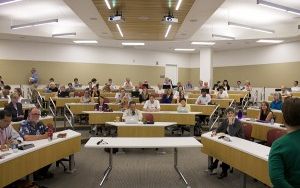 Press Release from The Utah Daily Chronicle
Press Release from The Utah Daily ChronicleBy Nathan Turner on October 7, 2013.
Contact Nathan Turner at
The October session of the Academic Senate approved a proposed cross-disciplinary certificate to the College of Engineering and Scientific Computing and Imaging Institute on Monday evening.
The new certificate, which draws from computer science, electrical engineering and mechanical engineering, will address the growing trend for collecting and managing large amounts of data which has not been addressed by current criteria at the U. Students also have the option of taking the certificate as a short intensive program and completing the track within a year. Those already working in the industry will have the option to take two courses per semester in order to lighten their load. This would extend the certificate time to two years rather than one.
Twenty-seven credit hours will be required in the areas of computer science, electrical engineering and mechanical engineering to add the certificate. All but one of the classes required for the certificate already exist at the U which will make the addition of the certificate relatively easy. Currently, there are no programs like this at colleges in the intermountain region and the addition of this program to the U could bring in a new, diverse group of students.
The Academic Senate also voted to discontinue the Revitalization of Endangered Languages certificate on the grounds that the U cannot offer the courses needed for the certificate due to changes in faculty. Because there are no students currently in the program, the decision to discontinue the program will have no financial or administrative impact on the university.
The Senate also voted to change the name of the Division of Cardiology to the Division of Cardiovascular Medicine. The name change was proposed in order to help the division to better reflect the name of the degree as well as the name of the fellowship program.
“It’s really to just keep up with the times [since most universities have done the same],” said James Chen Tson Fang, a professor in the department.
The last debate item on the Senate’s agenda was to amend part of the election process for Academic Senate. The change made was to make exceptions for certain colleges to elect members to the Senate as long as they have been faculty members for one year. The rule is usually a minimum of three years as a faculty member in order to run, but some colleges, like the new School of Dentistry, are not old enough to have had faculty members around for three years. The rule exists to ensure that elected Academic Senate members are focused on the future of the U.
